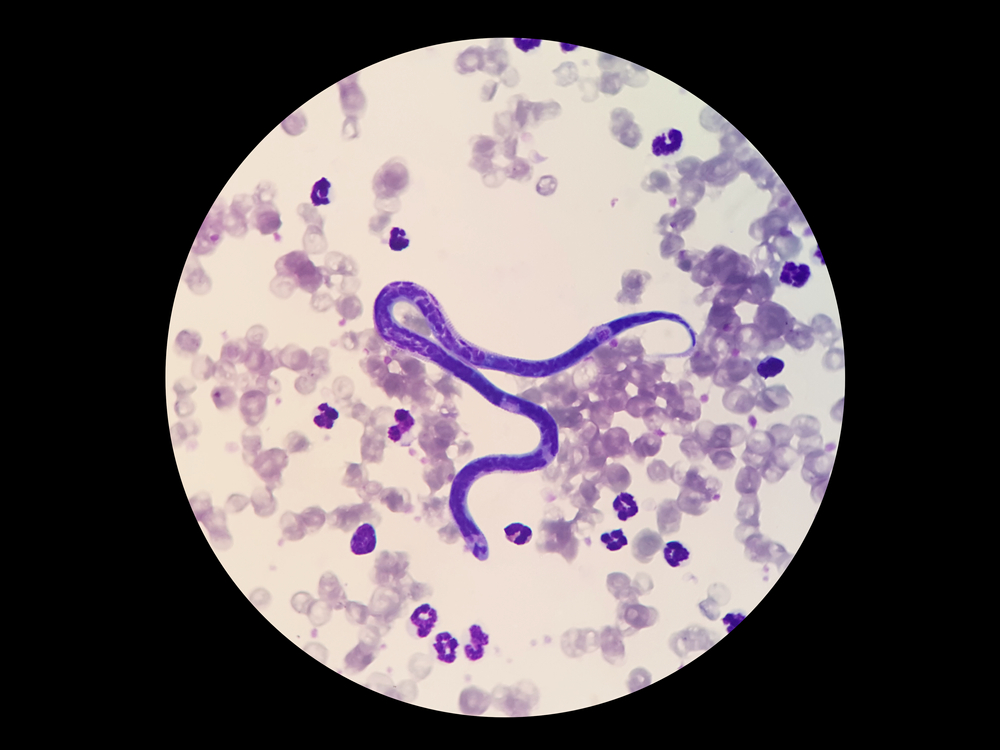How much do you know about heartworms? Heartworm incidence is increasing across the United States, and knowing about these dangerous parasites can save your pet’s life. Our Companion Care Animal Clinic team wants to test your heartworm knowledge, so we are giving you a pop quiz on the subject. Good luck!
Question: Can your pet get heartworms by playing with a heartworm-positive pet?
Answer: No. Heartworms can’t be transmitted directly from pet to pet, but a single heartworm-positive pet in your neighborhood significantly increases your pet’s infection risk. Heartworms are transmitted by mosquitoes, and a pesky mosquito that takes a meal from an infected dog or wild canine ingests baby heartworms (i.e., microfilariae). Once inside the mosquito, the microfilariae mature to a larval stage when they can infect other pets. When they are ready, the microfilariae travel to the mouth of the mosquito that then deposits them in their saliva as they feed on a vulnerable pet. If the conditions are right, the microfilariae swim through the bite wound and infect the pet.
Question: Are indoor pets protected from heartworm disease?
Answer: No. While pets allowed outdoors are at increased heartworm disease risk, pets who live solely indoors are not immune. According to the American Mosquito Control Association, mosquitoes are adept at entering your home through any portal available, including torn window or door screens, attic soffits, and bathroom exhaust vents. Mosquitoes also rest by your home’s doorways and enter when a door is opened. And, if your indoor pet enjoys a protected outdoor area, such as a balcony or porch, they can be a mosquito’s target.
Question: Are cats susceptible to heartworms?
Answer: Yes. Cats can definitely be infected by heartworms, but they are atypical hosts for the parasites, meaning heartworms typically can’t grow to adulthood while parasitizing the cat, although the immature heartworms can cause significant damage and serious health complications. When the heartworm larvae reach the cat’s lungs, the cat’s immune system reacts strongly, causing a massive inflammatory reaction that results in heartworm-associated respiratory disease (HARD). In addition, the cat’s heart is so small that only one or two heartworms that reach adulthood can cause a life-threatening blockage inside the heart.
Question: Are heartworm positive pets noticeably ill?
Answer: No—at least not in the early stages. Signs don’t typically manifest until heartworms have significantly damaged the pet’s heart and lungs. In some cases, sudden collapse or death is the first illness sign. When signs are present they include:
- Dogs — Heartworm-positive dogs show signs including lethargy, exercise intolerance, cough, and weight loss. The worms’ presence leads to thickening and narrowing of the lung vessels, which inhibits the heart’s ability to effectively pump blood through the body and eventually leads to congestive heart failure.
- Cats — Heartworm signs in cats typically mimic feline asthma and include increased respiration rate and effort, wheezing, open-mouthed breathing, and vomiting.
Question: Do pets need year-round heartworm prevention?
Answer: Yes. While mosquitoes are most active in the spring and summer months, hungry mosquitoes will search for a meal on any unseasonably warm day. In addition, peak mosquito season fluctuates every year, and if you start your pet’s heartworm medication a little late or stop a little early, they will be vulnerable to heartworms. Heartworm prevention medications kill microfilariae retroactively, and the maturing parasites are no longer susceptible to the medication. This means that if your unprotected pet becomes infected and you administer a dose the following month, the medication won’t affect the growing heartworms.
Question: Can you skip your dog’s heartworm test if they are on heartworm prevention?
Answer: No. Heartworm prevention medications are highly effective, but resistant parasites have been reported. In addition, dogs who spit out or vomit their dose when no one is looking are left unprotected. The American Heartworm Society (AHS) currently recommends testing dogs annually using two testing methods:
- Microfilariae test — This test concentrates the blood to detect circulating microfilariae. Infection must be present for about six months before microfilariae can be detected.
- Antigen test — This test detects a protein produced by the adult female heartworm. The antigen can be detected about six months after infection.
Question: Is heartworm prevention for your pet worth the cost?

Answer: Yes. Paying for year-round heartworm prevention is much less expensive than paying for heartworm treatment. Heartworm treatment for dogs is risky and extensive, involving many steps to kill the parasites at all life stages. Steps include:
- Stabilization — Since heartworm treatment is so risky, your dog’s condition must be stabilized before parasite treatment can start.
- Activity restriction — Physical exertion exacerbates the heart and lung damage caused by the parasites, and your dog must be strictly confined until the parasites are cleared.
- Microfilariae treatment — We prescribe medications to kill the circulating baby heartworms.
- Antibiotics — Heartworms carry a bacterial infection that intensifies the inflammatory process, and we prescribe antibiotics to treat the infection.
- Steroids — In some cases, we prescribe steroids to reduce the inflammation caused by the parasites.
- Adult heartworm treatment — Adult heartworm treatment involves painful injections administered into your dog’s lumbar region.
- Surgery — In severe cases, we perform surgery to remove the heartworms from your pet’s heart.
No heartworm medication is approved for cats, and treatment is focused on supportive care, so prevention is the only way to protect your cat from these dangerous parasites.
How did you do on the quiz? Our Companion Care Animal Clinic team will give you an A plus if you provide a year-round heartworm preventive for your pet. Contact us to determine the best product for your four-legged friend.







Leave A Comment